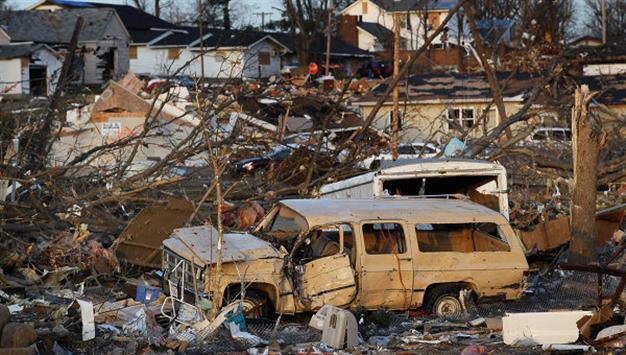27 dead, one town 'gone' as tornadoes rip central US
CHICAGO - Agence France-Presse

Vehicles and other possessions are scattered after a tornado ripped through a neighborhood. AFP photo
Rescue workers searched for survivors today after scores of tornadoes tore across the central United States, killing at least 27 people and wiping out whole communities.Trucks and trees were tossed aside like playthings Friday as deadly funnel clouds descended on five states.
The images were surreal: a school bus smashed through the wall of a house, trucks thrown into lakes, solid brick homes reduced to rubble and wooden ones smashed into kindling, mobile homes flipped like tin cans.
The death toll in Indiana reached 13 late Friday, officials said.
"Early reports indicate the heaviest damage is concentrated in southeastern Indiana including substantial damage in Henryville in Clark County, Marysville in Clark County, and Pekin and New Pekin in Washington County," the state Joint Information Center said in a statement.
Meanwhile, the Kentucky Department of Public Health has confirmed a total of 12 fatalities.
A total of 13 tornadoes passed through that state on Friday, according to the Kentucky Emergency Management agency.
Two more deaths were reported by authorities in the neighboring state of Ohio.
Fire stations, schools and jails were among the buildings torn apart and a rescue squad car in Kentucky was overturned and trapped under live power lines.
"I am constantly amazed by both the unpredictability and the ferocity of what Mother Nature can unleash when she chooses to," Indiana Governor Mitch Daniels told CNN.
"We've learned to be pretty humble out here about the way in which we mere mortals can prepare no matter how hard we try."
The latest wave of storms comes after a string of twisters killed 13 people earlier in the week.
The National Weather Service had received 83 reports of tornadoes in eight states by Friday evening, bringing the week's total to 133, though not all were confirmed.
More could be on their way as a "particularly dangerous" tornado watch was set to continue until early Saturday in four states in a massive storm that also carried golf-ball sized hail.
Officials in Clark County, Indiana were scrambling to deal with widespread damage from the storm after roads were blocked by fallen trees and debris, and power and phone lines were knocked out.
The hardest hit included the town of Marysville, about 40 miles (65 kilometers) from Louisville, Kentucky, which for all practical purposes has ceased to exist, officials said. "That's the information we have, that Marysville is no longer," US Senator Dan Coats of Indiana said in an interview with CNN.
The high school in Henryville suffered "quite a bit of damage," but luckily all the children were evacuated safely and only minor injuries -- some cuts and scrapes -- were reported, Major Chuck Adams, the sheriff department spokesman, told AFP.
Alabama's Madison county was also badly hit, with the weather service reporting "people trapped in rubble with injuries," houses destroyed, trees ripped from the ground and power lines down.
Six casualties were reported after 100 homes were damaged in Cleveland, Tennessee, the weather service said, and injuries were also reported in the town of New Pekin, Indiana.
This latest outbreak of twisters comes as people were still picking through rubble left behind by a series of twisters which struck six states on Tuesday and Wednesday.
The town of Harrisburg, Illinois was the hardest hit after it was ripped apart by a deadly twister that stayed on the ground for miles Wednesday, killing at least six people and injuring more than 100.
Some 545 people were killed by tornadoes in 2011, which was the deadliest tornado season since 1936 and the third worst on record, according to the national weather service.
This year, the tornados seem to have come a bit early with the mild winter creating the right conditions for cold fronts to slam into warmer air.
"We knew it was going to be bad," said Angie Lese, a meteorologist with the National Weather Service in Louisville, Kentucky. "All the ingredients came together for a significant outbreak."
Peak tornado season in the southern states is usually March through May, and in the northern states late spring to early summer.
















